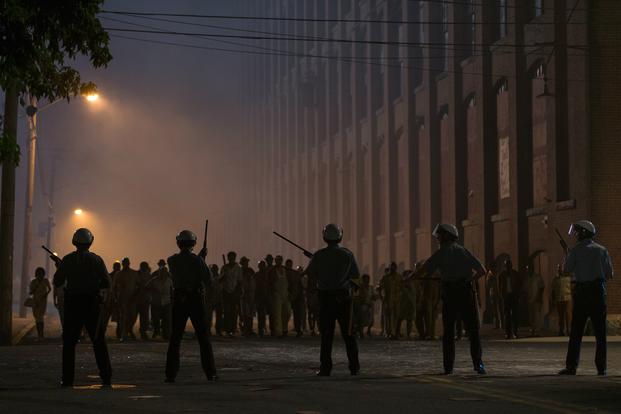"Detroit" (out now on Blu-ray, DVD and Digital) is the latest based-on-actual-events thriller from director Kathryn Bigelow ("Zero Dark Thirty," "The Hurt Locker"). Taking place during the brutal Detroit riots of August 1967, the film focuses on an encounter between the police and a group of young people at the Algiers Motel at the height of the unrest.
Bigelow and longtime screenwriting partner Mark Boal have gone back and tried to piece together what happened based on court testimony and interviews with the men and women who shared the experience. Memories are faulty and sometimes witnesses have an agenda and the movie doesn't present itself as The Truth. Sometimes it seems unsure of what's happening in front of the lens.
The incident that's the focus of "Detroit" is kicked off when a young guy named Carl (Jason Mitchell, so excellent as Eazy-E in "Straight Outta Compton" and as Mills in "Kong: Skull Island") is horsing around with a starter's pistol, making fun of how local cops harass folks in the neighborhood. The police hear the shot when he fires a blank to scare the other kids and mobilize to storm the building to find a "sniper."
Things devolve and Carl is the first kid killed by the officers on scene. They spend several hours harshly interrogating the group, demanding to know where the gun is and which one of them is the sniper.
As the situation gets worse, the cops are joined by a security guard (John Boyega, Finn from Star Wars) who tries to calm things down and provide a buffer between the white officers and the (mostly) African American suspects.
The "suspects" include a Vietnam veteran played by Anthony Mackie ("The Hurt Locker" and the Avengers movies) and a member of future '70s R&B stars The Dramatics (played by Algee Smith).
No one tells the police the story of the starter pistol prank. That might be because they don't believe the hyper-agressive cops will believe them, but they officers on scene know something happened and they're determined to get some answers.
The night ends with murder charges against the officers and the security guard and the film ends with a verdict in their trial.
Anyone who's forgiven Bigelow for sacrificing EOD technical detail for moviemaking suspense in "The Hurt Locker" will appreciate how the filmmaker uses the mundane details of a riot to ratchet up the tension in "Detroit." It's long and sometimes tough to watch, but this is a worthy addition to the director's body of work.
The disk comes with a variety of bonus features that chronicle the real-life riots and their long-term negative effects on the city of Detroit.






